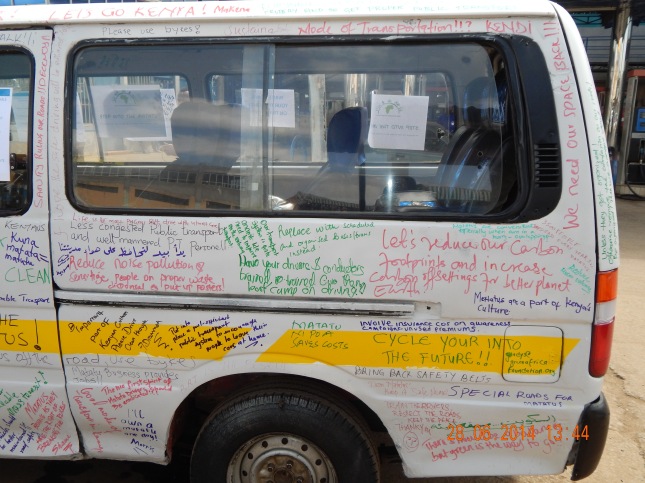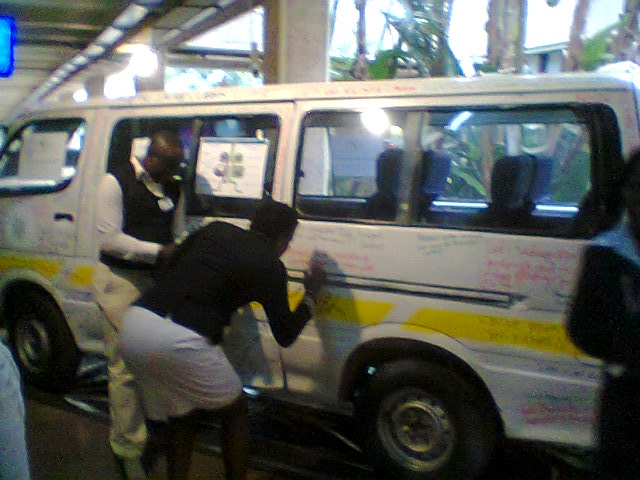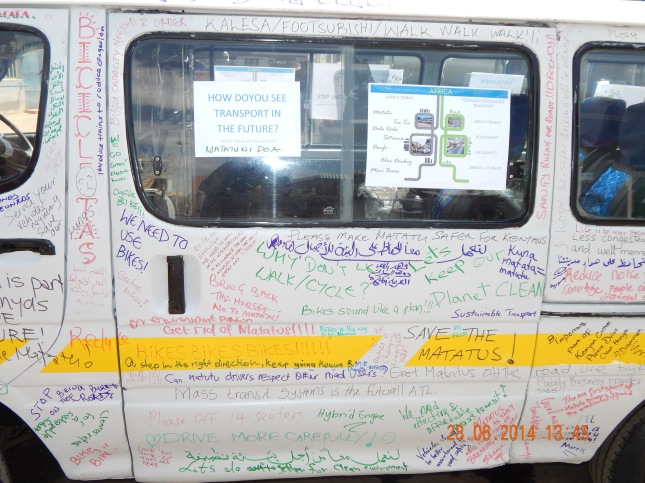During the recent UNITED NATIONS ENVIRONMENTAL ASSEMBLY {UNEA} held at UNEP HQs in Gigiri Nairobi; which I must add} was attended by his Excellency president Uhuru Kenyatta and UN secretary general his Excellency Ban kin moon,} I was honored to be part of what was going on. A Non Governmental Organization called SUSTAINABLE TRANSPORT AFRICA had put a matatu in their stand and visitors and delegates from across the globe had an opportunity to ‘’STEP INTO THE MATATU’’ and watch a 25 minute documentary by Aljazeera on the life and times of this matatu driver.
This was the first time I was coming face to face with the upper class; {people who very rarely use or may have never used a matatu in their life although they live in Kenya.} Majority were local and foreign expatriates who came for the Assembly; although they may be working or studying in the country.
I had the opportunity to interview some of them on camera and also gave them the opportunity to share by way of writing their thoughts on public transport in Kenya; on the freshly painted 14 seater Matatu’s body.
By the time the exhibition was over, I had corrected over 50 signatures and hundreds of views from those who graced our stand{ although I could not read some comments as they were written in Arabic, Italian, Germany and Dutch among our languages.]
Here are some of the comments and my take on the issues raised.
Use bike and cars that use less fuel. This came from a non Kenyan- it is a positive pointer toward encouraging use of Non Motorized Transport {NMT} and a very economical view too. The problem with Kenyan roads and especially Kenyan Drivers is failure to observer, implement and understand the rights of pedestrians and other non-motorized road users.
A bike rider is more at risk than a passenger in a matatu. On using cars that use less gas, that’s for the matatu investors to make the switch and increase on the profits.
Bring Eco-friendly Matatus.The industry itself is still informal; we are still strangling to learn how to organize ourselves into groups, companies and Sacco’s. This will become an option when the government declares war on black carbon emissions and pass laws to caution the same.
Bring better conditions in Matatus. This I can promise you, we are working on; the Sacco’s and management companies are all geared to bring order and structural management in passengers transport including comfort.
We need to ensure we do not leave our youth jobless in the process.This comment was one of the few positive one’s. This came from a Kenyan who knows that change always comes with lots of adjustments. As we push for change in the matatu industry, we should also bear in mind that the industry is the major employer of mostly those who have no credible academic qualifications. The industry should be given time to evolve and for the workers to adjust gradually.
Stop the madness on our roads.Matatu madness has been with us and it has refused to go no matter how many laws we pass in parliament. The problem has to do with individuals who for one reason or the other, decides to ignore traffic regulations and lack of proper training. Corruption has played a very big role in fueling the so called madness by allowing dangerous drivers on the road despite accidents records and convictions.
Reduce Radio volume.I agree with this comment and a know 80% of passengers would want to see the volumes governed. Matatu workers, especially the souped-up manyangas can be even health hazardous to be honest. Sacco’s and management companies must do something or else the government can enforce the existing law barring load music in public service vehicles.
Please work For the earth; from the heart and for no heat.An Australian advice: clearly stated. We should really be concerned and work hard to make mother earth a better place; we must do this from our hearts; come up with ways to reduce heat/ global warming.
Please matatu drivers and conductors respect other road users; the road does not belong to you.I don’t know if this was a request or a reminder, but this writer [a female Nairobi motorist] must have seen enough madness and arrogance from matatu drivers and only wish that matatu workers could at least show respect to other road users.
POLICE to stop taking bribes and enforce order.Corruption is to blame for the slow progress in the transport sector’s advancement and in obedience to traffic rules and regulations by matatu drivers. It is not surprising to see a conductor asking passengers in a fully loaded 33 seater matatu for loose change to give to a police officer. If the police did their job and prosecuted the guilty, we can hope the magistrate would punish them by application of the law. If only the fines were realistic. Setting high fines encourages corruption; lets punish drivers by withdrawing their licenses.
Avoid over speeding.Point noted! Although I would like to add that; Matatus don’t normally over speed since they all have speed limiters/ governors, what they do is drive carelessly / dangerously within the permitted speed..
If you change everything but not your attitude, it will be all in vain. Change your attitude.This is meant to reach all the stakeholders, government, operators and passengers; if we- all- have positive attitude and willingness to bring the change we want, nothing will stop us. But as long as we have the same attitude we have had all along, all efforts will be in vain.
Take hygiene matters seriously, especially makangas and reduce rudeness.The idea of introducing informs for matatu workers and dustbin in all public service vehicles was designed to address hygiene in mass transportation but unfortunately it did not achieve the desired goal. Personal hygiene should come from individuals and saccos and management companies should ensure tidiness in their vehicles. Workers should also be given some training on public relations to enhance interactions between providers and users.
The use of moneyless payment.(from 1st July 2014)is a violation of my private data. personal opinion/ concern. i don’t have the facts so, no comment.
The matatus should be safe, should be taken for service like any other car to avoid emissions which affect even the ones walking. Sound maintenance of motor vehicle should be insisted and inspections conducted after six months instead of annually. Any vehicle that emits more that the allowed level should be grounded and registration number retained by the police until the vehicle is repaired and certified by the relevant body.
Clean, neat, good uniformed matatu touts; No torn clothes, No bad language. Matatu touts are constantly pointed for untidiness. They seem to care less about their public appearance and also belittle their uniforms. You can find a makanga wearing two pairs of clothing’s- a neat civilian cloth set and a dirty maroon uniform on top. This is a tell sign that the wearer does not value his job and bad mouthing customers cannot be ruled out.
We need eco-friendly transport. Yes we truly need eco-friendly transport; Kenya being a developing country has a chance to putting this measure in place. It should be one of the vision 2030 goals.
Kenyans roads will be safer with more training for drivers and conductors. I share the same thoughts with whoever wrote this comment. Education is the key- and training matatu drivers through seminar and workshops would go a long way in changing the current game plan used by matatu operators. Most of us have never had any kind of training before we joined the industry.
We need bigger matatus which respect other road users. Bigger matatus are coming soon in urban centers since the law does not allow new registration of 14 seaters. The problem of violating other road user’s rights still stands with the drivers. Let’s hope the new system which requires drivers to be permanent employee will tame them.
Light rail, pedestrian’s path. This probably came from a visitor in the country who might have seen how effective light rails have been in other countries and wish we could do the same. I wont comment of that but as for pedestrian’s walks; this should be given top priority. We continue to lose hundreds of pedestrians every year through accidents. Building a safe area for walking while we are constructing our roads can greatly reduce these casualties.
Check the Jamaican Public Transportation System, http://www.jutc.com . One of the delegates; a logistics Assistant from Jamaica/ working with United Nations took me a side and we held a lengthy discussion about how kenya can transform our transport system toward sustainability the same way Jamaica did.




Razvan
January 15, 2015 at 5:55 pm
Hahaha awesome pictures 😀
LikeLike